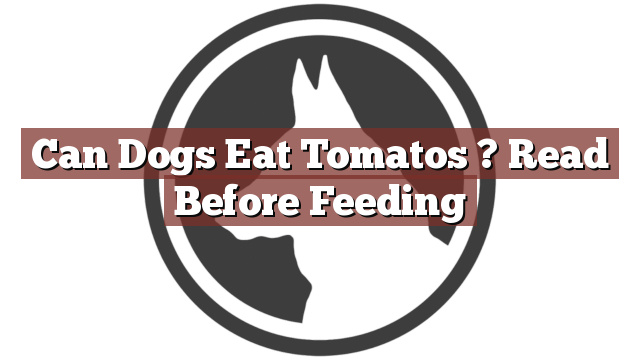Understanding Your Dog’s Dietary Needs
As a responsible dog owner, it is crucial to understand your furry friend’s dietary needs. While dogs are omnivores and can consume a variety of foods, it is important to be aware of what is safe and beneficial for them to eat. Feeding your dog a well-balanced diet is essential for their overall health and longevity. However, when it comes to certain foods like tomatoes, it’s important to investigate further before incorporating them into your dog’s diet.
Can Dogs Eat Tomatoes? Read Before Feeding
Can dogs eat tomatoes? This question may have crossed your mind while preparing a meal or snacking on this popular fruit. The answer is both yes and no. While tomatoes are not inherently toxic to dogs, some precautions should be taken before feeding them this juicy treat.
Yes, dogs can eat ripe tomatoes in moderation. The ripe fruit itself is not poisonous to dogs and contains several important nutrients such as vitamins A and C, potassium, and fiber. However, it is crucial to remove the green parts of the tomato plant, such as the leaves and stems, as they contain tomatine, a toxic substance that can be harmful to dogs.
Pros and Cons of Feeding Tomatoes to Dogs
When considering whether to feed tomatoes to your furry companion, it is essential to weigh the pros and cons.
Pros: Ripe tomatoes contain valuable nutrients that can contribute to your dog’s overall health. The vitamins and minerals found in tomatoes can support their immune system, promote healthy digestion, and help maintain a glossy coat. Additionally, the high water content of tomatoes can help keep your dog hydrated.
Cons: While ripe tomatoes are generally safe for dogs, there are some potential risks to be aware of. Firstly, tomatoes are acidic and may cause stomach upset or digestive issues in some dogs, especially if consumed in large quantities. Secondly, if your dog has a known history of food allergies, it is advisable to introduce tomatoes cautiously, as they can be a potential allergen.
Conclusion: Weighing the Risks and Benefits of Tomato Consumption for Dogs
In conclusion, while it is safe for dogs to consume ripe tomatoes in moderation, it is important to exercise caution. Remember to always remove any green parts of the tomato plant, as they can be toxic to your furry friend. Additionally, keep in mind that each dog is unique, and some may have sensitivities or allergies to tomatoes.
If you are unsure whether or not to include tomatoes in your dog’s diet, consult with your veterinarian. They can provide personalized advice based on your dog’s specific needs and health conditions. As with any new food, it’s always best to introduce it gradually and monitor your dog for any adverse reactions.
Remember, the key to a healthy and happy dog lies in a balanced diet, regular exercise, and plenty of love and attention from their human companions.
Thank you for taking the time to read through our exploration of [page_title]. As every dog lover knows, our furry friends have unique dietary needs and responses, often varying from one canine to another. This is why it's paramount to approach any changes in their diet with caution and knowledge.
Before introducing any new treats or making alterations to your dog's diet based on our insights, it's crucial to consult with a veterinarian about [page_title]. Their expertise ensures that the choices you make are well-suited to your particular pet's health and well-being.
Even seemingly harmless foods can sometimes lead to allergic reactions or digestive issues, which is why monitoring your dog after introducing any new food item is essential.
The content provided here on [page_title] is crafted with care, thorough research, and a genuine love for dogs. Nevertheless, it serves as a general guideline and should not be considered a substitute for professional veterinary advice.
Always prioritize the expert insights of your veterinarian, and remember that the health and happiness of your furry companion come first.
May your journey with your pet continue to be filled with joy, love, and safe culinary adventures. Happy reading, and even happier snacking for your canine friend!

